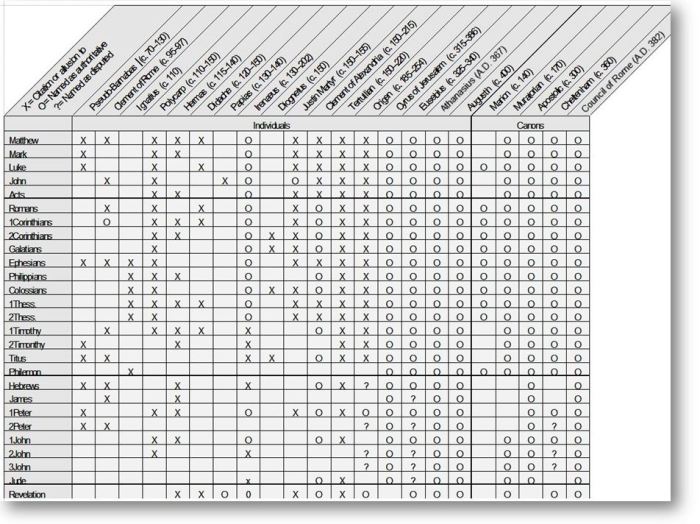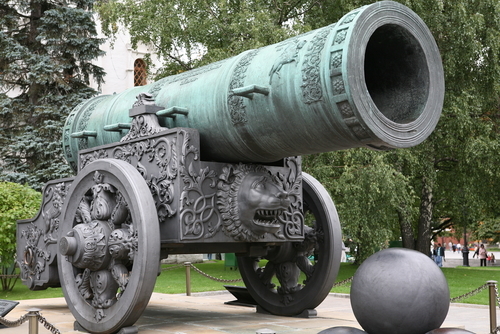I believe the "few words" in Ephesians 3:3 are the few words that God uses to direct our passage through scriptures. And it strikes me as peculiar that the words, "wrote afore," rhymes with the number four.
Last edited:
Upvote
0
This is of course inaccurate. The Council of Trent defines the Old Testament canon:
I am well aware of the history of the development of the canon, a matter which was settled with the universal acceptance over a few centuries of the canon of St. Athanasius.

Once more, the Peshitta includes all 27 books. It is simply that those used in the Assyrian Church usually only include the 22 books the Assyrians read in their lectionary. West Syriac copies have the "whole enchilada ." ....
Not on the level of authoritative canon.
No, he merely put them in the back of the Bible and expressed reservations about them.
Irrelevant - as we've seen, all kinds of different canons at different times have different books. One could just as well argue that the Epistle of Barnabus must be canonical because, after all, it's in the Constantine Bibles. It wasn't until 1870 that the RCC declared Mark 16 as canonical.Incorrect; Mark 16 is in the Vulgate translated by St. Jerome.
This is completely untrue. The Coptic canon contains precisely the 27-book canon with no additional material. The Ethiopian narrow canon, which consists of those books the Ethiopians deem doctrinally relevant, is the same. The Ethiopian broader canon does include the Didascalia and a few other Patristic works, which are accepted throughout Orthodoxy, but these are not regarded by the Ethiopians or anyone else as protocanonical scripture.
All of the Orthodox churches, the Catholics, the Assyrians, the Anglicans, and most other Protestants agree as to its contents. That sounds "settled" to me.
Whereas the NT issue is settled, the OT is not, although it was more settled before the rather misguided decision of the early reformers to use the Masoretic text was made.
This event did not in fact occur.
The textual variations even between the Textus Receptus and the Minority Text are relatively minor.
You must first understand how Paul reveals the revelation before you can know how the KJV Bible is implicated. Nevertheless, all other versions are irrelevant to the hidden mystery in the KJV Bible.The KJV includes the deuteronical books. In the event, Ephesians 3:3 says nothing about the KJV, and the KJV NT has the same books as every other legitimate NT since roughly St. Athanasius.
I will show a way the NIV has striped important information from the Word of God. Look at Genesis 1:2 in the NIV, and then look at Genesis 1:2 in the KJV Bible. Do you see the changes made in the NIV; those are the changes that strip information from the Word of God!
Their is a bundle of stuff that goes into a translations of Scripture. The KJV published in 1611 using the best texts and the best scholarship that were available to them at that stage. In the 400 years since that time the world of biblical academic scholarship has advanced, we have better and older texts and manuscripts, we have better scholarship and a better grip on the text.I've heard that the total amount of text that is in the KJV but absent in the NIV is more than the whole books of 1 and 2 peter. Do you know of a source for that? I did find this:
The NIV removes a total of 64,576 words, which is 8% of God’s word.From: The Most Accurate Bible Translation Comparison KJV vs NIV Bible Study
-Papias
Don't worry about it, one thread wrong is enough to invalidate the book. And actually, one wrong word can invalidate the entire thread. Do you need more?I've heard that the total amount of text that is in the KJV but absent in the NIV is more than the whole books of 1 and 2 peter. Do you know of a source for that? I did find this:
The NIV removes a total of 64,576 words, which is 8% of God’s word.From: The Most Accurate Bible Translation Comparison KJV vs NIV Bible Study
-Papias
Yes, the 66 book cannon in the original language.Most of the Christian world believes in the inspiration or inerrancy of the Bible, but I am not sure that most of the Christian world is aware that there are different collections of books (canons) of the Bible. The greatest differences are in the New Testament books.
The Nestorian canon excludes 2 and 3 John, 2 Peter, Jude, and Revelation
The Armenian canon included 3 Corinthians and excluded Revelation until about 1200 AD. The Armenian Apostolic churches at times included the Testament of the Twelve Patriarchs in their Old Testament canon.
The Coptic-Arabic church included the Apostolic Constitutions and the Epistles of Clement.
At various times different Protestant sect sought to exclude 2 and 3 John and 2 Peter.
Luther excluded James.
So, do you still believe there is ONE inerrant or inspired collection of NT books? If so, which one?
Yes, the 66 book cannon in the original language.

Irrelevant. Just as we saw earlier, there have always been tons of different canons given by popes, saints, and others - and people later often ignore what others have done, proposing yet another canon.
It's the fallacy of hindsight to take what your own Bible has now, look back until you see someone propose that canon, and then declare that they and only they are the ones who were right. That's exactly what most of your posts have consisted of.
Do you deny that the Clementine Vulgate had those books? If moving them to the end removed them from the canon already, then you have to agree that Luther removed three books from the New Testament in the 1500s.
Here is a useful overview, and even this is an oversimplification. Note that other canons are proposed well after Athanasius, so he didn't settle anything. :

Here is the source. It's a pretty useful article.
The Biblical Canon and Christian Tradition
Some do have 27, some have just 22.
Again we are back to your hindsight fallacy: "Because these have the books I want, they are right - and the others are wrong and always have been wrong."
hindsight fallacy.
... exactly as the RCC moved 3 and 4th Edras and the prayer of Manasses to the back, before removing them in 1979.
Irrelevant - as we've seen, all kinds of different canons at different times have different books. One could just as well argue that the Epistle of Barnabus must be canonical because, after all, it's in the Constantine Bibles.
It wasn't until 1870 that the RCC declared Mark 16 as canonical.
The additional books (Sinodos, the book of the covenant, the didascalia, and clement) in the broader New Testament canon are included because they are scripture.
If they weren't, they wouldn't be in there, just like 3 Edras.
Claiming that they somehow not part of the canon is just like the hindsight fallacy - "if they agree with my Bible, I'll call them scripture, otherwise I'll say they aren't scripture."
It's no coincidence that some of these book are the same ones that early church fathers included as part of the New Testament, as shown by the graph above.
Did you miss the big discussion above about the KJV and the KJV onlyists?
The KJV has so much additional text that it adds up to be longer than some books, and include paragraphs at times.
So do we agree at least that their never was a canonical OT, even to today, that has been agreed upon?
So the Nova Vulgate never happened?
Or did Luther not remove James, Jude and Rev from the New Testament?
Hold on here - so if there are differences, and you want to ignore them, you call them "relatively minor", but if we are talking about whether or not another church's Bible is correct, their differences become heretical?
The Jehovah's Witnesses are often called "not Christian" because their translation of John differs by two words.
Yet, between the different Bibles you are calling "relatively minor" here, the differences are many dozens of words.
Can we agree that different Christians have different Bibles?
In Christ-
Papias
Sounds trivial. Unless you meant it as a lol. then it is funny.
There is a little difference between a canon and a cannon. One of the problems I have found is those who use the canon as a cannon.
Sorry, I did mean to hit your funny bone. However I do find it distracting when the wrong word is used - and given the difference between a cannon and a canon this is one that gets me quite a lot.Sounds trivial. Unless you meant it as a lol. then it is funny.
In a sense you say it is not the point, and then rephrase it as you description of the point with what you perceive is the logical extension of the point.So much of the conversation seems to be about what these various denomination have as their canon TODAY. That is not the point. The point is, the fact that there has not been a universal Christian canon of the NT in the past argues against a single, inspired/inerrant canon.
So what significance has that? Do I get a bubble gum cigar or something?
Never
mind.
So much of the conversation seems to be about what these various denomination have as their canon TODAY.
That is not the point. The point is, the fact that there has not been a universal Christian canon of the NT in the past argues against a single, inspired/inerrant canon.
Most of the Christian world believes in the inspiration or inerrancy of the Bible, but I am not sure that most of the Christian world is aware that there are different collections of books (canons) of the Bible. The greatest differences are in the New Testament books.
The Nestorian canon excludes 2 and 3 John, 2 Peter, Jude, and Revelation
The Armenian canon included 3 Corinthians and excluded Revelation until about 1200 AD. The Armenian Apostolic churches at times included the Testament of the Twelve Patriarchs in their Old Testament canon.
The Coptic-Arabic church included the Apostolic Constitutions and the Epistles of Clement.
At various times different Protestant sect sought to exclude 2 and 3 John and 2 Peter.
Luther excluded James.
So, do you still believe there is ONE inerrant or inspired collection of NT books? If so, which one?
